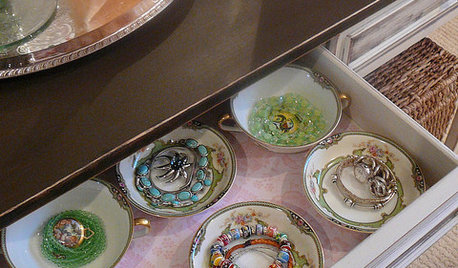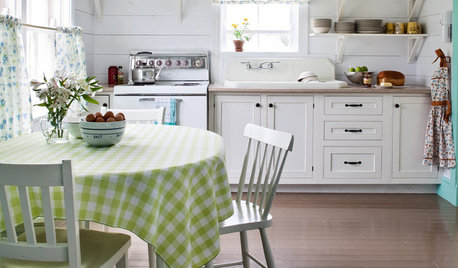Anyone else getting concerned?
macybaby
12 years ago
Related Stories

DECORATING GUIDESThe Cure for Houzz Envy: Dining Room Touches Anyone Can Do
Get a decorator-style dining room on the cheap with inexpensive artwork, secondhand furniture and thoughtful accessories
Full Story
DECORATING GUIDESThe Cure for Houzz Envy: Guest Room Touches Anyone Can Do
Make overnight guests feel comfy and cozy with small, inexpensive niceties
Full Story
LAUNDRY ROOMSThe Cure for Houzz Envy: Laundry Room Touches Anyone Can Do
Make fluffing and folding more enjoyable by borrowing these ideas from beautifully designed laundry rooms
Full Story
COMMUNITYCommunity Building Just About Anyone Can Do
Strengthen neighborhoods and pride of place by setting up more public spaces — even small, temporary ones can make a big difference
Full Story
BUDGET DECORATINGThe Cure for Houzz Envy: Entryway Touches Anyone Can Do
Make a smashing first impression with just one or two affordable design moves
Full Story
CLOSETSThe Cure for Houzz Envy: Closet Touches Anyone Can Do
These easy and inexpensive moves for more space and better organization are right in fashion
Full Story
MUDROOMSThe Cure for Houzz Envy: Mudroom Touches Anyone Can Do
Make a utilitarian mudroom snazzier and better organized with these cheap and easy ideas
Full Story
BEDROOMSThe Cure for Houzz Envy: Master Bedroom Touches Anyone Can Do
Make your bedroom a serene dream with easy moves that won’t give your bank account nightmares
Full Story
BUDGET DECORATINGThe Cure for Houzz Envy: Living Room Touches Anyone Can Do
Spiff up your living room with very little effort or expense, using ideas borrowed from covetable ones
Full Story
KITCHEN DESIGNThe Cure for Houzz Envy: Kitchen Touches Anyone Can Do
Take your kitchen up a notch even if it will never reach top-of-the-line, with these cheap and easy decorating ideas
Full StoryMore Discussions






digdirt2
beeman_gardener
Related Professionals
Holly Springs Landscape Architects & Landscape Designers · Hyattsville Landscape Architects & Landscape Designers · Harvey Landscape Architects & Landscape Designers · Burien Landscape Contractors · Florham Park Landscape Contractors · Fountain Valley Landscape Contractors · Northport Landscape Contractors · Pacifica Landscape Contractors · Petaluma Landscape Contractors · Houston Roofing & Gutters · Schenectady Roofing & Gutters · Chicago Ridge Roofing & Gutters · East Hill-Meridian Roofing & Gutters · Hillcrest Heights Roofing & Gutters · West Orange Roofing & Gutters2ajsmama
ediej1209 AL Zn 7
digdirt2
bev_w
booberry85
skeip
readinglady
shambo
girlgroupgirl
oukay
digdirt2
readinglady
ljpother
david1948
david52 Zone 6
Kerry Vetter
calliope
caavonldy
AaronRWise
flora_uk
tracydr
oukay
pixie_lou
2ajsmama
oukay
afeisty1
2ajsmama
decemberdaisy
2ajsmama
beti1948
pixie_lou
pixie_lou
John__ShowMe__USA
bevinwinecountry
cziga
2ajsmama
2ajsmama
harvestingfilth
morz8 - Washington Coast
2ajsmama
morz8 - Washington Coast
calliope